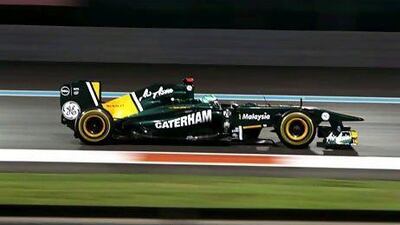As Formula One cars screech around the Yas Marina Circuit today, big business deals will be quietly struck behind the scenes by captains of industry entertaining valuable clients.
Closer to the action of the race, carefully placed adverts pepper the track; encircling stands sell team merchandising and drivers' cars, caps and overalls are emblazoned in sponsors' logos.
Welcome to one of the most expensive sports in the world, where business meets pleasure and sponsorship is every bit as important as the race result.
"It's a big budget sport. Formula One is littered with rich people who come in and then have to leave it because they can't afford it," says Mike Gascoyne, the chief technical officer of Team Lotus.
"There is a great saying: if you want to become a millionaire in Formula One start as a multimillionaire."
Team Lotus, which returned to competing in the sport last year, landed a sponsorship deal this season with one of the world's biggest companies.
"The great thing for us is not just that we have got GE as a sponsor, but that sponsorship is going from strength to strength," says Mr Gascoyne.
"It's expanding because they are feeling value. They also love the competitive edge and that we are the team who are going to come from the back and move up with them is a great story. That's where the pressure is because I've got to deliver it."
The partnership is valuable to Team Lotus, which has several sponsors including Dell, because of the financial security it offers and the technical collaboration it can bring. And having such a big and well-respected company on board lends the team extra credibility.
"It was a little bit of a signal to the other teams that we have got one of the biggest companies in the world with us," says Team Lotus driver Heikki Kovalainen.
"People respect us in the paddock and they think that we are going to move up the grid. And I think some of the teams ahead of us are probably worried about that. It's just a matter of time."
Mr Gascoyne admits that team principal Tony Fernandes' aviation industry connections came in handy in securing the deal, because it is "tremendously difficult" to get good sponsorship on board in the current economic climate.
It costs about £40 million (Dh236m) for each team to be in F1, which covers only the building of the cars and parts for the season, plus travelling and turning up at the race. Anything above that is spent on going faster, which is why teams need sponsors.
But the benefits companies receive are big.
"Each grand prix is still, I think, the third-biggest televised sporting event in the world. The other two are the World Cup final and the Olympics. They are once every four years. We do it 20 times a year … In terms of the global hit, it's massive. Each race is watched live by something like 340 million people," says Mr Gascoyne.
But some companies choose to sponsor races or venues instead of teams.
"The event brings a great value to Abu Dhabi … We are part of the fabric. We are one of the important players in the development of Abu Dhabi," says Salah Al Tamimi, the head of the corporate communication department of National Bank of Abu Dhabi, which has been the event's official bank for the third year running.
Mr Al Tamimi refuses to reveal how many guests the bank will entertain at the event over the weekend. But he stresses that the value of corporate hospitality cannot be disputed.
"Our customers really enjoy it and appreciate it … It's a win-win situation," he says. About 15,000 people will be entertained throughout the weekend at the Paddock Club, which is the biggest in the calendar.
"There are a lot of hospitality opportunities at the circuit. That 15,000 is just one section," says Steven Umfreville, the commercial director of the Yas Marina Circuit.
"If you look at the way the Yas Marina was built … it is very much of a place to do business and network," he adds.
Few individuals buy paddock tickets. The main buyers are either organisations, multinationals or local companies.
The Paddock is a place where companies entertain important clients, and teams host sponsors. And some, including the host, will use the opportunity to try to pick up some more.
"This is a great opportunity to introduce and re-sign sponsors that you have been involved in or are looking to get involved in Yas Marina Circuit or Formula One or any part of our business," says Mr Umfreville.
"This is our jewel … it highlights the capabilities of Yas Marina Circuit and obviously what we can do all year round. There will hopefully be a few more deals done over the weekend for Yas Marina Circuit."


